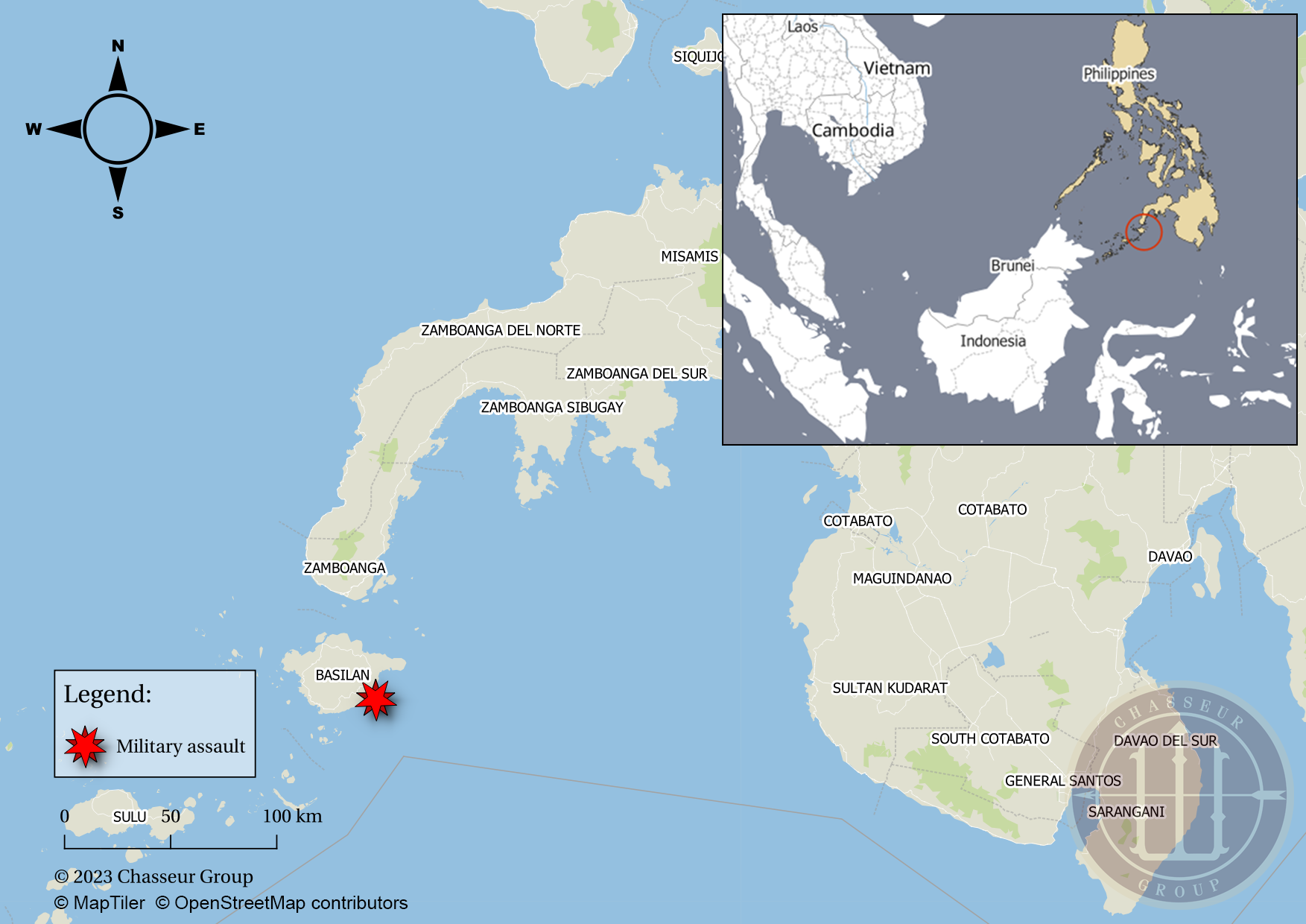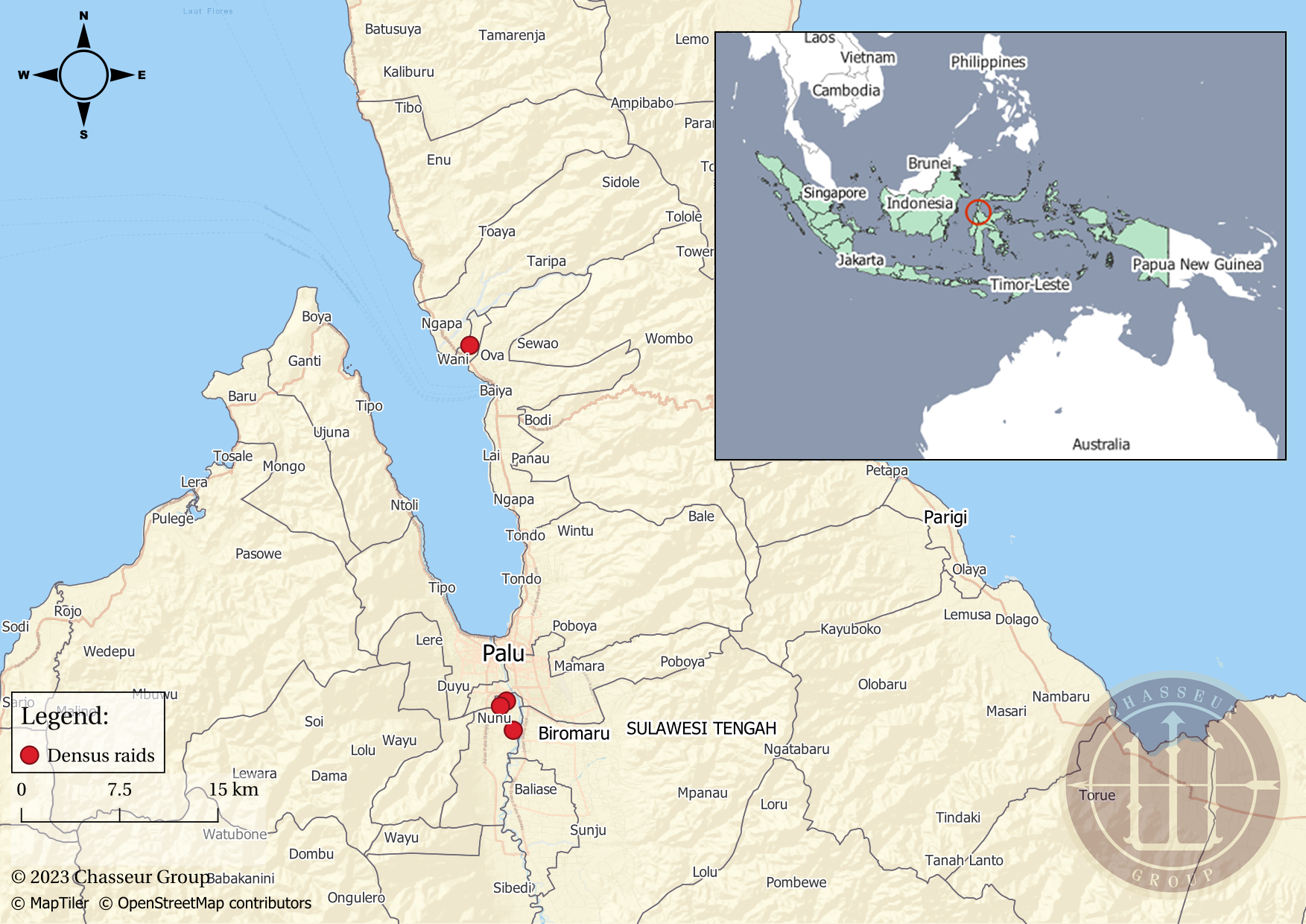The Memo: 27 Mar—2 Apr 2023
The Memo's latest issue covers security topics from Mar 27-Apr 2, 2023, including counterterrorism in S. Philippines, terrorism raids in Central Sulawesi, political unrest in Israel, US journalist's arrest in Moscow for spying, and China's reciprocal retaliation in tech war with US.

In brief:
- Military operations in Basilan province led to two firefights against militant groups, resulting in the recovery of various items. An ASG member involved in a 2017 kidnapping was also arrested in Zamboanga City.
- Indonesia's Densus 88 seized items, including 90 arrows, in raids on four locations in Central Sulawesi. Indonesia lost hosting rights for the 2023 FIFA U-20 World Cup due to a warning of potential terrorist attacks if Israel participated, with Bali refusing to host Israel's team.
- Israeli Prime Minister Benjamin Netanyahu's firing of defense minister for opposing judicial reforms led to mass protests. Reforms were temporarily delayed but concerns over anti-democratic changes in Israel may have consequences beyond the region.
- Israeli forces conducted airstrikes in Syria's Homs province, targeting several air bases in central Syria, including an underground research center where Iranian scientists are suspected of developing missile and drone capabilities.
- US journalist's arrest in Russia over spying allegations highlights the tensions between the West and Russia stemming from the Ukraine conflict. Criticism is directed at the Biden administration's previous prisoner swap with a Russian arms dealer.
- An explosion at a St. Petersburg cafe allegedly owned by Yevgeny Prigozhin, the owner of Wagner Group, killed Russian military blogger Vladlen Tatarsky during a speaking engagement, injuring 25 others.
- China's CAC investigates Micron Technology's local sales in China over national security concerns as Micron relies on China for over 10% of its sales. The review indicates increased attention to cybersecurity due to technology tensions, possibly resulting in reciprocal retaliation.
1. Counterterrorism updates in Indonesia and the Philippines
i. Philippines
The Joint Task Force and Naval Forces Western Mindanao conducted a military operation targeting militants in Basilan province. This led to two firefights against the Abu Sayyaf Group (ASG) and another armed lawless group in Kaulungan Island, Al-Barka in the province of Basilan (see Fig. 1). Following the clashes, the troops recovered various items, including rifles, a rifle grenade, a radio, parts of firearms, and personal belongings.

Meanwhile, an ASG member believed to be involved in the 2017 kidnapping of a town mayor's son was arrested in Zamboanga City. Salip Yusop Habibulla was captured (pictured in Fig. 2), along with a cellular phone and an identification card bearing the name "Murhan Alih Ismael".

Why it matters: ASG presence in the Basilan area continues to pose a threat to the security of Southern Philippines. However, the persistent military pressure on militant activities in the region has been effective in dismantling key ASG members and encouraging surrenders from fatigued and disillusioned members who lack access to resources. While military operations serve as a deterrent to potential ASG actions, however the unidentified armed group operating with ASG in the area may indicate the emergence of a new and unknown militant faction attempting to resist the military's efforts.
ii. Indonesia
Indonesia's counterterrorism squad Densus 88 carried out raids on four locations in Central Sulawesi (see Fig. 3), believed to have been used by the Jemaah Islamiyah (JI) terror network for fundraising. Following the recent arrest of five JI members on March 16, Densus 88 searched the offices of the Khairu Ummah Foundation, Friends of Justice Foundation (Sahlan), and an elementary school office linked to the former. During the operation, Densus 88 confiscated various items, such as documents, books, laptops, and several weapons, including 90 arrows.

Indonesia's terrorism expert warns that Israel's participation in the 2023 FIFA U-20 World Cup could result in terrorist attacks, and identified three possible groups. President Jokowi's meeting with the Palestinian ambassador attempted to counter opposition, but Indonesia's strong support for Palestine led to significant resistance. Bali's decision not to host Israel's team led to Indonesia losing hosting rights, raising concerns over its future involvement in FIFA tournaments and potential sanctions.
Why it matters: JI's tactic of using charity organisations and schools to support extremist activities is well-known, and the recent discovery of weapons and personal items during clearing operations underscores the need for active monitoring and disruption of these organisations to prevent their activities as still poses a threat, even if latent. JI is still exploiting these institutions to raise funds and promote their ideology. While it is crucial for Indonesian law enforcement agencies to remain vigilant and take necessary measures to combat terrorism and extremism, however political players gearing up for the 2024 elections should be cautious by avoiding politicising counterterrorism efforts, considering the recent controversy surrounding the 2023 FIFA U-20 World Cup.[1]
2. Developments in MENA
Israeili Prime Minister Benjamin Netanyahu caused a crisis in the country by firing Defense Minister Yoav Gallant for calling a halt in judicial reforms. This move resulted in widespread protests, a general strike, and hunger strikes by local council leaders, including members of Netanyahu's own Likud party. Netanyahu announced a temporary postponement of the reforms, but extremist politicians are pressuring him to dismiss Gallant, leading to an impasse over the latter's future. Meanwhile, Israeli forces carried out airstrikes on outposts in Syria's Homs province, hitting several air bases in central Syria where Iranian personnel are based (see Fig. 4). An underground research center where Iranian scientists are suspected of developing missile and drone capabilities was among the targets.

Why it matters: Netanyahu's decision to pause his plan to weaken Israel's Supreme Court highlights the complex balancing act he faces in keeping his governing coalition intact. Observers believe that he must appease his far-right and religiously conservative allies who support the judicial overhaul while also considering concerns from moderate politicians, the US, and opposition from within Israel's military. The potential anti-democratic changes in Israel could have consequences beyond the region and lead to instability in the entire Middle East due to Israel's nuclear weapons, occupation of Palestine, and religious extremism. Also, the recent Israeli airstrikes on outposts in Syria's Homs province, hitting several air bases in central Syria where Iranian personnel are based, indicate a continued escalation in the ongoing conflict between Israel and Iran. These strikes suggest that Israel is determined to prevent Iran from establishing a military foothold in Syria and to disrupt Iran's efforts to supply arms to militias through aerial supply lines. The incident may also increase tensions in the region and the likelihood of further retaliatory actions.
3. Updates on Russia and Ukraine conflict
Evan Gershkovich, a US journalist working for the Wall Street Journal, has been arrested in Russia and accused of spying. The Kremlin claimed that he had been caught "red-handed", but the Wall Street Journal denied the allegations. Gershkovich has been detained until May, and espionage in Russia carries a maximum jail term of 20 years. Meanwhile, an explosion occurred at cafe in St. Petersburg, allegedly owned by Yevgeny Prigozhin, the owner of Wagner Group. The explosion, believed to be caused by an IED, resulted in the death of Russian military blogger Vladlen Tatarsky, who was present for a speaking engagement attended by 100 people. The incident also left 25 others injured.
Why it matters: The arrest of Gershkovich, an American journalist accused of spying in Russia, highlights the strained relations between the West and Russia due to the ongoing conflict in Ukraine. Critics argue that the Biden administration's exchange of American athlete Brittney Griner for notorious Russian arms dealer Victor Bout was a disastrous decision, as it may have compromised US national security and left Americans overseas more susceptible to being taken captive as a bargaining tool in future diplomatic negotiations. In the meantime, observers are speculating that there is a high likelihood that the recent IED explosion at Prigozhin's cafe in St. Petersburg was driven by political motives due to the growing tensions within the Kremlin. Despite Prigozhin's close relationship with the Russian president, the Wagner Group's unsuccessful operations in Ukraine could negatively affect Prigozhin's political prospects.
4. Cybersecurity and emerging technology issues
China's Cyberspace Administration of China (CAC) has initiated a cybersecurity investigation into Micron Technology's local sales in China, citing national security concerns. Micron's relationship with China has been tense due to the expansion of domestic memory chip manufacturers such as Yangtze Memory Technologies. The regulator did not disclose specific reasons for the review, but it was suggested it may be due to risks such as product manipulation, data theft, and supply chain disruption. Micron's sales rely on China for over 10% of its total sales, with Shenzhen Long Sys being a major customer, purchasing $491m worth of chips in 2021.
Why it matters: The Chinese government's investigation of Micron Technology is the first instance where it has targeted a US semiconductor firm. This move comes amidst a technology war with the US, which involves export control measures and the addition of Chinese technology companies to its entity list. Moreover, TikTok, owned by Beijing-based ByteDance Ltd, was investigated by US lawmakers last week. The cybersecurity review of Micron suggests that both countries are giving increasing attention to cybersecurity due to technology-related tensions. This could be interpreted as a reciprocal retaliation.
Please feel free to share The Deep Dive with your colleagues and we would appreciate it if you could consider becoming a free or paid subscriber once we introduce our tiered subscription packages to support our publication. Your support will help us continue providing valuable insights to assist you in making operational decisions.
Read our Flashpoint for our analysis on this threat. ↩︎



